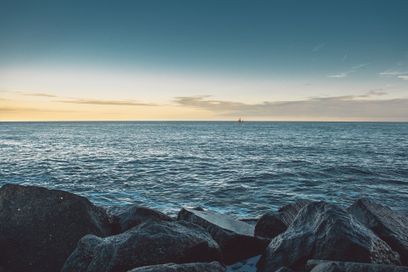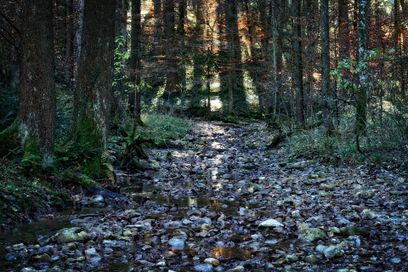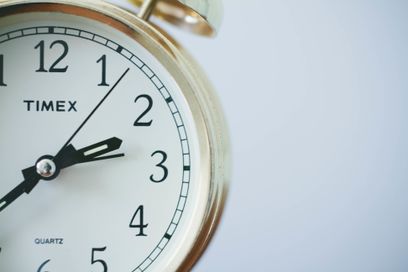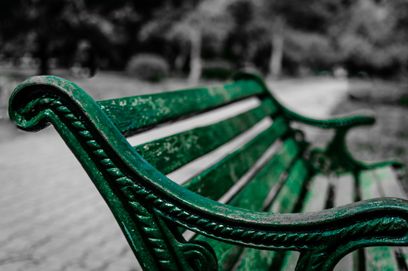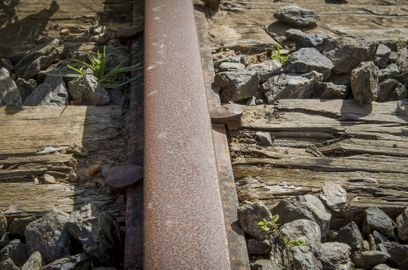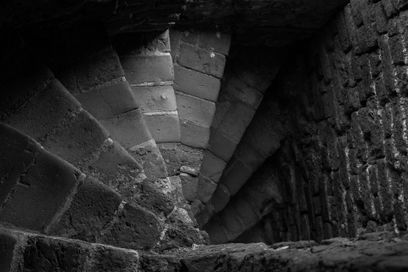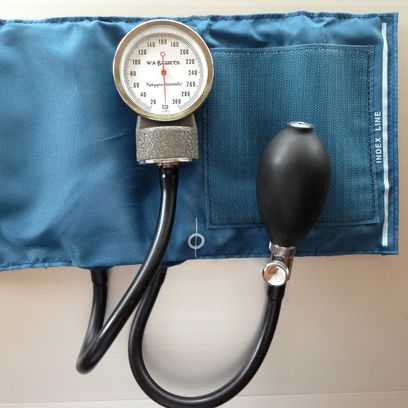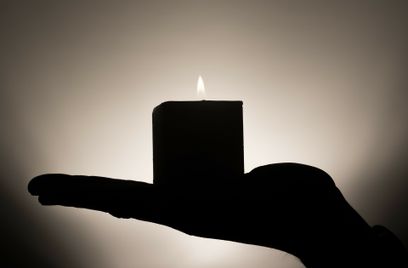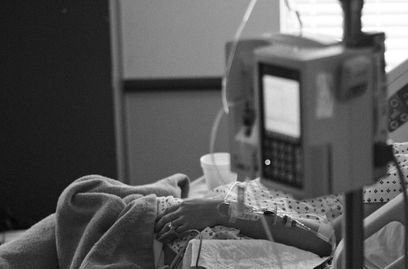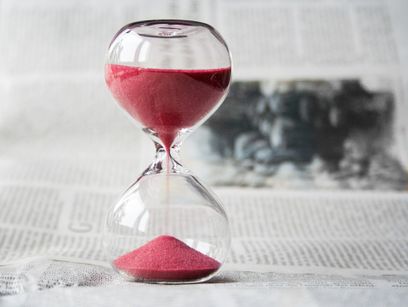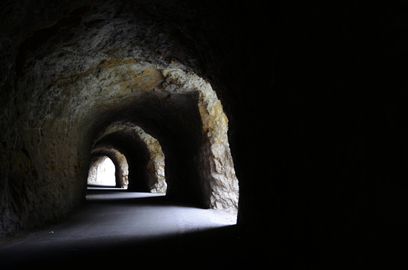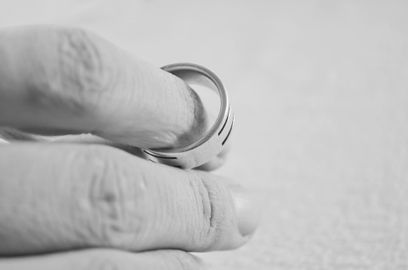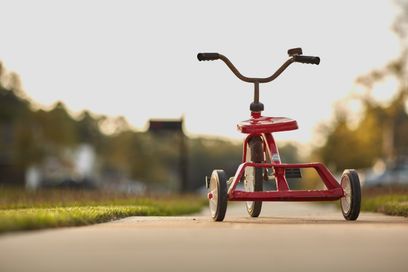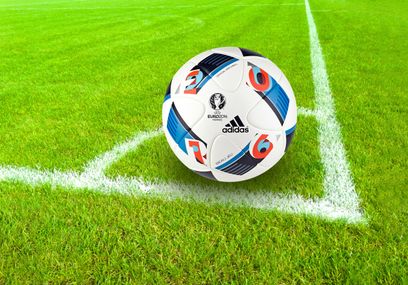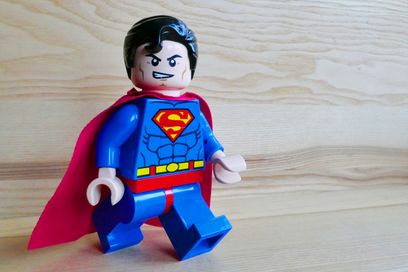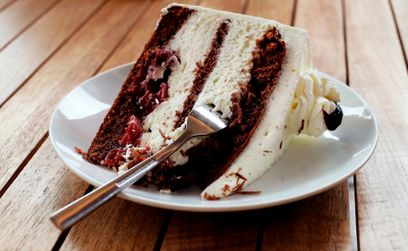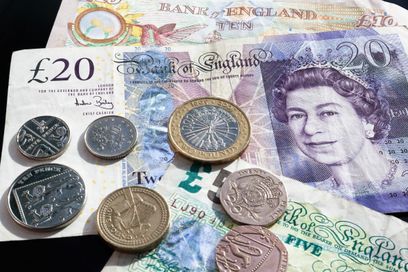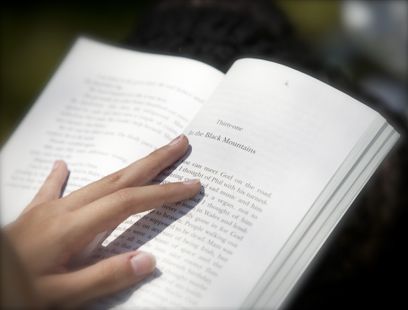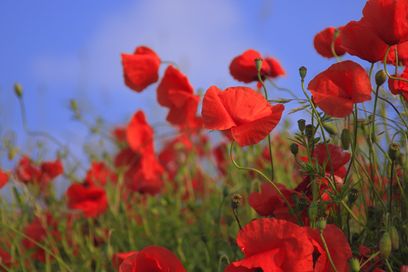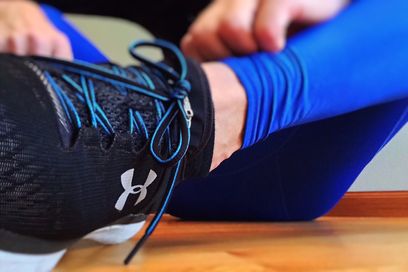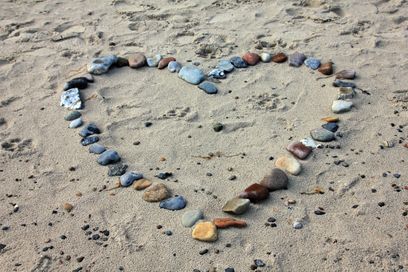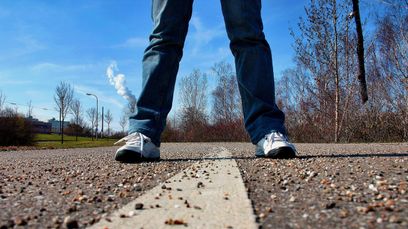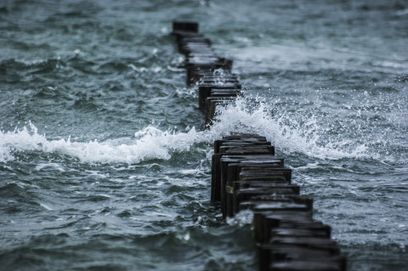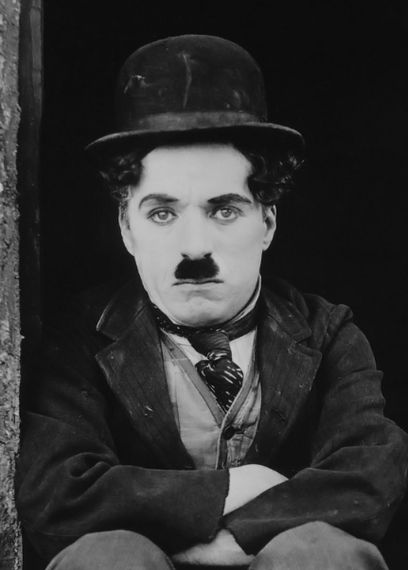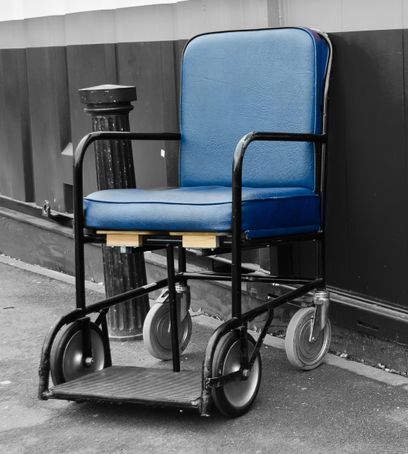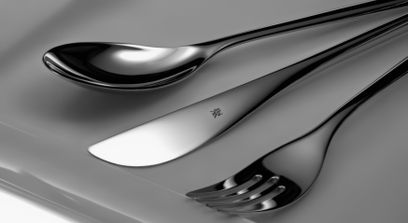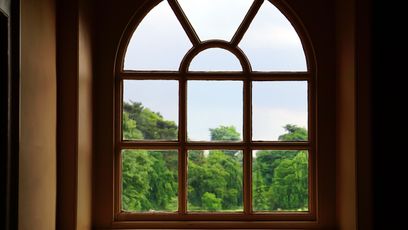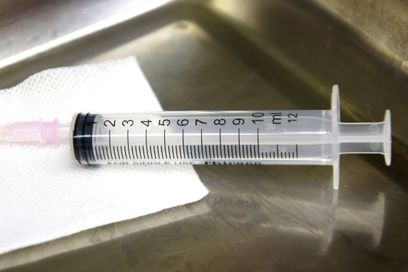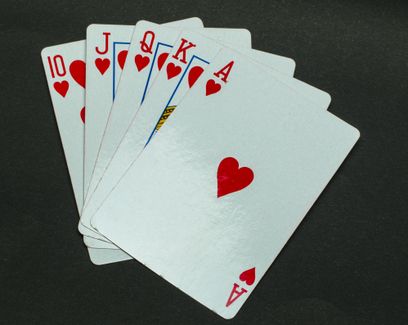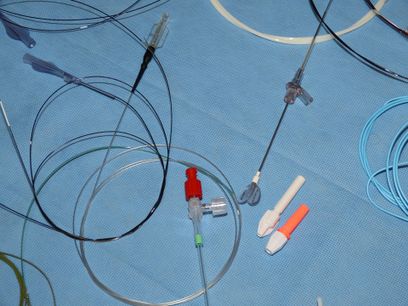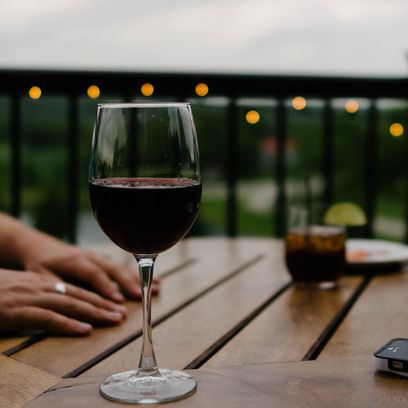
Out of the Woods Blog
This is the story of my family. And how our lives were rocked by a sudden, devastating illness in 2014. And how we got through the most difficult of times, with lots of support from the people around us.
2. Hospital-bound
So, that first weekend. I can’t recall many of the details, but suffice to say, it was miserable.
3. Waiting
The hospital is not far from our house - around 15 minutes with no traffic. It shouldn't have been a difficult journey really. Marc and I went home from the doctors and gathered a few things (well I gathered a few things - he was incapable of doing much at all). We spoke to Marc's mum, who had come over to see how he was. I tried to reassure her that the hospital was what he needed and things would get better once he was treated there. Then we set off.
4. Difficult to admit
That day felt like the longest day ever. We sat for an hour in A&E waiting to be seen. To be fair to the staff at the hospital, it was only an hour - like I said the doctor's letter went a long way towards cutting our waiting time. But Marc was in such a bad way that by the time his name was called I was ready to scream.
5. Comfortably Numb
I don't remember a lot about that evening. It was a Monday, which meant no clubs for the children - it's our one free night where there is no Beavers, football, swimming, taekwondo, ballet... I must have collected the children from after school club and explained to them that Daddy was in hospital where the doctors could keep a close eye on him. I think I tried hard to reassure them that it was all going to be ok. But to them 'hospital' meant nothing. They accepted what I said completely and without question: Daddy was being looked after and would be home with us again soon.
6. A Brave Face
After leaving the hospital I went to collect the children from after school club. I must have fed them somehow, though I can't remember whether we went home for a snack or whether I resorted to McDonalds. Either way, we set off for what would be the last visit they had with their dad for the next four weeks. None of us knew this at the time, obviously. I am of the definite opinion that the ability to see into the future could never be a good thing. I have no idea if I would have coped had I known what was in store for us all.
7. Mounting Terror
I struggled to understand what was being said to me, partly because I was still half asleep and partly because things had seemed so much better before I had gone to bed. It seemed difficult to comprehend how things could go from a state of being 'fine' to one of dire emergency in a mere four hours. But clearly they could.
8. Trauma in the early hours
I pushed open the doors to the ward, certain I would be greeted by chaos and panic. Instead, it seemed at first to be as dark and silent as you would expect a hospital ward to be at night. I was uncertain what to do, but headed instinctively in the direction of Marc's room. As I got closer I was approached by a nurse, who asked who I was. Confirming that I was who I'm sure she had been told to look out for, she took me by the arm and steered me into a small alcove at the side of the nurse's station. As she did so, I began to notice that there were a lot more people on the ward that would be normal at night time. They were all clustered in and around Marc's room, just working quietly, presumably trying to minimise disruption on the ward.
9. Silent Suffering
Once the lift reached the floor below we exited, and I remember blindly following the strange procession down a number of corridors with little idea of the direction we were going in. Eventually we stopped, seemingly in the middle of the darkened corridor. I wondered why, until the Irish doctor came over and told me that the scanning department was not yet open as we were still waiting on the on-call radiographer to arrive. We were literally standing in the hallway outside the door to radiography, waiting for a member of staff with a key and the knowledge to work the scanner.
10. An Alien Place
At some point later, Marc arrived up in ITU on a trolley. I saw them wheeling him past the waiting room door and taking him into the Intensive Care ward. I think maybe Claire came back in to speak to me briefly, but there was nothing much else to say apart from to repeat that Marc needed to be 'settled in' to ITU, and this, apparently, would take a while. At some point (I can't recall when) I was told that the scan had shown nothing other than some fluid in the stomach which, although notable, did not reveal the mysterious cause of the illness. This meant that Marc was still struggling on with no concrete diagnosis and therefore no further ideas for how to deal with whatever was attacking his body.
11. Breaking Dawn
I don't remember much about the rest of the night. We sat alternately with Marc and in the waiting room. When I was in with him, I had no idea what to do. There were nurses flitting around the almost silent ward throughout the night, and those assigned to Marc attended to him regularly, administering drugs and drips and making regular checks on his levels, which didn't show any signs of improvement. I felt useless in comparison.
12. Operation Endurance
After that it was just a case of waiting for them to take Marc to surgery. I say 'just a case', but in reality those hours spent waiting for something to happen were agony. We had very little to occupy our minds, other than frightening thoughts about what might happen to him. At this point, my memories of what happened begin to become a little mixed up, so where up until now I have been quite clear on the order that things happened, from this point on I may be less so.
13. A Fleeting Relief
Sometime mid-afternoon, we watched a trolley with a multitude of equipment being wheeled past the door of the ITU waiting room. Marc was being brought back from surgery, having been down there for between three and four hours. I felt a huge sense of relief: the possibility that he would not come back from the operation alive had never been far from my mind.
14. Dazed and Confused
At some point my sister Janet arrived. I'm not sure when. I'm pretty certain she came straight from work, leaving her husband or in laws to collect her own children from school and nursery. We must have begun to let other people know what was happening, because I knew that Marc's best friend (also called Mark) was on his way and his brother Matthew was still somewhere on the M1 or M6 driving the 250 miles between Brighton and Warrington. Most of that afternoon is a complete daze to me.
15. A Sense of Protection
I made it through to early morning with only one more phone call to ITU to reassure me. Janet stayed with me overnight, sleeping in the spare bedroom, and I was eternally grateful for her support. In taking the phone away from me she protected me from numerous other messages of concern and allowed me the relative peace I desperately needed. In total, I got around 4 or 5 hours of sleep in two separate sessions, the ITU phone call (again telling me there had been no change) sandwiched in the middle. By 6.30am, I was wide awake and ready again to be back at Marc's side.
16. Daisies
I don’t know to this day what made me ask such difficult questions of the doctors, I only know that once I realised that Marc was seriously ill, something inside of me kicked in and I had to know everything, as if my understanding more about Marc’s condition could save his life. On speaking to Linda about that day, I can now see how differently we were dealing with things; that she did not want to hear that her son was ‘unlikely to survive’ when I asked the question. She understood that I was attempting to cope with what was happening in whatever way I could, but found this difficult to hear. She was doing the same as me: just trying to cope with her son’s sudden illness in whatever way she could, it was just that she was doing it in a very different way. She says that while I went into ‘fighting mode’ and wanted to take action, her reaction was more of a spiritual one, to pray for help for Marc.
17. A Diary
I spent much of the Thursday afternoon answering questions. I suppose this made a change from incessantly asking them. Now that they knew Marc had Strep A and his drugs had been altered accordingly, they wanted to know how he got it. This meant me attempting to deal with a barrage of queries about Marc's habits and his routine over the past few weeks. I found it quite frustrating that my answers didn't ever seem to satisfy the doctors and (to this day actually) we still don't know how Marc picked up the bacteria.
18. The Bigger Picture
Thursday night passed in a blur. I must have got some kind of sleep, but again it was punctuated by a couple of calls to ITU to check on Marc. The next day was going to be a difficult one - the first where I had very little support. My grandma had died earlier that month, before Marc had become ill, but her funeral had been postponed due to several members of the family (my parents included) being out of the country on holiday. It had now been planned for the following Friday, the 4th July. Since my dad had come home from his holiday he had been waiting to drive over to York, where most of his family live, to make the final arrangements for the funeral with his brother and two sisters. I think he had been putting it off because of my situation, but spoke to me on the Thursday and asked if I minded him and mum being away for the day to go to Yorkshire and make the arrangements.
19. The Drugs Don't Work
After that Friday, the days begin to blur a little. Once Marc was at this stage, the things that were happening to him began to be far more slow, and the progress he made was snail-like. That weekend, we started to follow the usual ITU visiting hours. I remember Linda asking the ward sister if we should stop trying to be there all day every day and being told that now might be a good time to only visit in the afternoons and evenings, for a couple of hours at a time.
20. Don't Tell The Children
Over the next few days things started to settle into a pattern. ITU visiting became normality for us, and Marc remained on the same level of support. One of the most difficult things to deal with at the beginning was the children. Not their behaviour. I think I have previously said how amazing they were. Somehow they became complete angels, and I don't recall having to tell them off about anything in the first few weeks of Marc's hospital stay. Genuinely.
21. World Cup Fever
As we stand now in the midst of football fever, England's performance in the Euros dominating the news, I am reminded of the 2014 World Cup, which had just started when Marc became ill. I remember Daniel had a Wall Chart from the newspaper which he was going to fill in, and he had planned to watch some of the matches with his dad. Not that I want anyone under the impression that Marc is a huge football fan - he isn't! He's far more into music than he is football, and prefers running or mountain biking to watching footy. But Dan enjoys it, and plays for a local team, so the two of them were going to have some father-son bonding time watching England's performance.
22. The Real Heroes
On Monday 30th June Marc was trialled off the dialysis for a second time. This time, his levels held, and it was decided that his kidney function had improved enough to get rid of the dialysis machine. In other words, his kidneys had recovered sufficiently to mean they didn't need support any more. This was a massive relief, and felt like a real step forward for Marc. I suppose in terms of all the organs which had been 'broken' or were functioning at less than 100%, his kidneys were the first to bounce back. And by 'bounce back' I mean they took several days to recover enough to be capable of sustaining themselves.
23. Life Goes On...
As Marc’s second week in hospital stretched on, real life began to intrude. I considered work. As a teacher, I only had three weeks to go until the summer holidays. One evening, two of my colleagues (and friends), Catherine and Kate, came round to see me, extremely concerned. They brought cake, I think, homemade if I know Catherine, and both enveloped me in their arms as soon as they came through the door. Not a simple 'nice to see you' kind of hug. An intense hug which lasted several seconds and tried to convey their care and concern for me, their wonder at how I was holding it all together (sometimes I wasn't), and their despair at having no real idea of how they could possibly help me through this.
24. Passing on the Message
The more I write about the period of Marc's illness, the more complex my thought patterns become. What started off as a simple chronological account of events has begun to sprawl in my mind. I find myself recalling little things which happened in the early days of Marc's hospital stay that have been missed out of this blog, because I had forgotten about them until recently.
25. It's all about the Money
If thinking about contacting friends to let them know about Marc's illness was difficult, starting to consider the financial side of things was even more of a challenge. The last thing I wanted to do was look at bank balances or insurance policies. But I quickly realised that facing this kind of thing was important.
26. Literary Therapy
Many of my posts recently have involved how I was coping with the emotional and practical side of things while Marc was in hospital. And though that side of things is important when contemplating coping with a close family member being ill, the central focus should always be the person who is sick.
27. The Right Decision
Aside from worries about Marc's health, how the children were coping, and how we might cope financially if Marc were ill long term, two weeks into Marc's hospital stay, my grandma's funeral took place. If it had been vital for Mum and Dad to take time away to organise it, it was obviously even more important for them to attend it, so on Friday 4th July, they planned to drive over to York to attend it with my sister and the rest of the family.
28. Happy Birthday!
I recently celebrated my fortieth birthday, and with it came the celebration of two years since Marc's illness. It put me in mind of the length of time we were told Marc would take to recover, back when it first started to look like he was going to survive. Healing from the kind of trauma his body had experienced was going to take a long time. I remember speaking to one of the sisters, and I must have been being overly optimistic about getting Marc 'back to normal', because she gently informed me that recovery of the sort that Marc was going to have to experience was not going to be fast. She suggested a figure of two years, and I remember thinking two things: one, how ridiculous - it won't take that long, and two, it's my fortieth birthday in two years, if that's how long it will take for Marc to recover, we're going to have one hell of a party!
29. A Marathon Challenge
Fitness and weight have played an important role throughout Marc's period of illness. Before he became ill, he was 42 and had begun training for a half marathon, probably a nod to the 'mid-life crisis' turning 40 can bring on. He had felt the need, upon reaching that momentous age, to get fitter and set himself a new and challenging goal. The English Half Marathon was set to take place in Warrington in September 2014, and Marc had signed up to run it, along with a couple of friends, the previous November. He had spent much of the darkest months of winter 2013-14 training in the evenings, and by spring he was running distances of up to 7 or 8 miles. He was, justifiably, proud of himself and well on track to achieve the 13 mile distance he planned to run in the autumn.
30. Recovery
I feel like I have spent a lot of time recently describing my concerns about the other things which were going on in my life, outside of Marc’s recovery. But while all these things were going on in the background, Marc’s condition had (almost) stabilised; there was no longer a constantly present, terrifying, could-die-any-moment feeling, and Marc had begun the extremely long and challenging road to recovery. His diary chronicles his progress in brief, but does not go even part of the way towards describing the millions of steps Marc had to go through to begin the process of getting ‘back to normal’.
31. Breathe Again
In the days following my birthday, the ITU staff began the process of trialling Marc off the ventilator to see how far he was able to breathe on his own. He was put on to a 'step down breathing circuit', using a machine called a Drager, which I came to completely despise. It is a piece of equipment which allows a patient to breathe for themselves while still supporting them to some degree, depending on their condition. Basically, it allows the lungs to attempt to work by themselves again, but still gives the patient some assistance with their breathing. The support given by this machine can be increased or reduced, depending on how well the patient is doing.
32. The Fragile Heart
During the initial days of Marc being put on the Drager machine, he continued to struggle. He didn't seem to be able to manage anything other than attempting to strengthen his lungs again, and I could sense his pain, frustration and despair every time he was put on to the step down breathing circuit. Visits became even more of a challenge, trying to gauge how we could best support a man who was clearly trying very hard to do as the nurses were instructing him, and his family was willing him to do, without much success.
33. The Battle to Breathe
As I write today's post we have recently returned from our first holiday abroad since Marc's illness. We spent a gorgeous fortnight in Menorca, doing little other than swimming, resting, reading, eating out and generally enjoying each other's company. The children did fight, and on occasion I became frustrated with them, but all I had to do was remind myself that sibling arguments are part and parcel of normal life, and two years ago life was so far from normal that sibling arguments did not even register in my thoughts. Thinking back, I don't remember the children arguing at all during Marc's first few weeks in hospital, as though they knew I couldn't have dealt with it. It almost made me enjoy their childish disputes during the holiday (almost - not completely, I hasten to add!)
34. Independence
My past few posts have focused on the difficulties (and eventual triumph!) of Marc learning to breathe independently again, and while this took up an awful lot of our time and energy during those weeks in July, he was having to deal with plenty of other things too. The other issues were perhaps the reason Marc's breathing took so long to return to normal: he had so much going on with him health-wise, healing was an interminably slow process. I imagine if you are in hospital for a single ailment, your body is usually able to heal itself fairly quickly, as it only has one thing to concentrate on. But Marc had multiple things going on, many of which were not visible to the naked eye, but internal issues. His body was clearly having a hard time trying to make all the different parts of him well again.
35. Wired Up
I just dropped Marc off at the Cheshire and Merseyside Treatment Centre behind Halton Hospital to have an operation on his foot, so I am channelling my nervous energy into writing next week's blog post. He is having a fairly major (in our eyes anyway) procedure done, which will hopefully put his feet at less risk of breaking down due to pressure sores because of his clawed toes. He is only a day case, so he won't need to be there overnight, but just entering a hospital makes me uncomfortable these days, so dropping him off was difficult, to say the least.
36. A Balancing Act
It is now a week since Marc had the operation on his foot, and so far, all seems well. He was at the hospital all day until I collected him at around 7pm, but thankfully was able to come home. I was so happy that he didn't need to spend the night at the hospital, which would have been bad for us all mentally. I think, despite their minds being fairly easily distracted, both Daniel and Amy were concerned about him. Dan wanted to know exactly what he was having done, how long it would take and when he was expected to come home. He's very precise and likes to know every details about everything. He also doesn't like it when things don't go exactly as planned. Amy is usually more laid back, but the first thing she asked when Linda brought her home from school was if her daddy was home yet. When he wasn't, she looked worried.
37. Visiting Daddy
When we arrived I first took the children into the waiting room. I never knew what to expect when I arrived at ITU each day. In theory, by visiting time the doctors had finished their rounds and most of the nurses' duties for the day had been taken care of. They would only take care of the tasks that had to be done hourly or were completely necessary during the times when visitors came. Still, Marc was fairly immobile and needed to be turned or rolled in the bed every couple of hours to prevent bed sores developing, and I didn't want to burst in with the children and see the curtains closed around the bed.
38. First words
Not long after the children had visited Marc for the first time, the nurses began to talk to us about the next stage of returning Marc to his independent status: removing the trache from his neck. I was thrilled at the prospect, not least because one less strange appendage attached to Marc's body would make the children feel more at ease with him. And getting rid of the trache meant being closer to getting out of ITU. I hadn't been told much about where Marc would be transferred to after leaving ITU: one thing was for sure though, he wouldn't be able to come straight home.
39. Moments of Humour
I'm trying to tell this story chronologically, but often that becomes quite difficult. Part of the reason I wanted to write this blog was to allow myself to remember what happened to our whole family through those challenging months in 2014 and all the time that has followed. To create a chronicle which I can look back on and celebrate our survival. Part of it was to organise the chaotic events that occurred in my own mind so that I could properly process them. But the more I write, the more I remember, and sometimes I recall things which happened right back at the start, despite the fact that my blog has taken us way past that point now.
40. Let's Get Physical
I have spent a lot of time extolling the virtues of nurses in this blog, and I feel very strongly that more people should realise the amazing job that they do, but so far I have omitted to focus on a group of people who were just as key to Marc's recovery as the nurses. The physiotherapists.
41. A Refreshing Drink
Once Marc was able to breathe unaided and had begun to work with the physiotherapists in earnest, the next job to tackle was that of him starting to eat and drink independently. Again, this might seem like a tiny, insignificant step: surely eating is second nature, but as ever with Marc, progress was incredibly slow and the road to eating again was a difficult one.
42. Eating Again
The second time I took the children to visit Marc in ITU was a much more successful visit. This time, because he was signed off and able to eat proper food again (albeit mostly liquid food to begin with), the tube had been removed from his nose. He had now been told that he didn't need the intravenous drip to feed him anymore as he was able to eat for himself. It turned out that Daniel had been most bothered by the tube up his dad's nose, so without that there, both children managed a calm, fairly pleasant visit with their dad. Marc was visibly brightened by their presence, we had brought things for the children to do when they became bored, and we didn't stay for too long, which seemed to be the best plan all round.
43. Getting Out and About
It was round about this point that Marc began to get a little stronger and was more able to complete his exercises. He was always visited daily by the physios and, like I have said before, their work with him often went on in the background of everything else. His physio was also the thing which was disrupted if Marc was feeling 'off' at all: if he had been sick after a meal or had not managed a good night's sleep. He was managing to 'sit out' for longer periods, I was told, although more often than not he did this in the mornings and by the time I arrived to visit he had become tired and was back in bed.
44. Christmas Post
It seems quite fitting that my last post of the year (I’m not writing one next week – we will be enjoying our Christmas holiday as a family!) should concern the momentous occasion when Marc was actually permitted to leave ITU. It was August 7th and had been a long time coming. 43 days to be precise.
45. New Beginnings
Happy New Year! Apologies for the lack of communication so far in January. I've decided to write a new post once a fortnight now, so my tale will continue at a slightly slower pace. That sort of suits the story though, as once Marc moved to his new ward, things did progress quite slowly as he began to adjust to his new surroundings and continued to recover.
46. Settling In
As Marc settled into A5, he began to adjust to his new surroundings. The nurses in the ward were mostly excellent, and the sisters I met were amazing: organised, compassionate, experienced, sensitive. With so many patients and so many different daily needs to attend to on such a busy ward, they had to be. There is only ever one sister on duty per ward at a time, and when you consider that A5 had four different bays filled with six beds each, plus several separate single rooms, that adds up to a lot of patients! But somehow both of the sisters I got to know managed to supervise the nursing staff who looked after the patients' needs; organise the auxiliary staff who brought meals and did less 'medical' jobs; keep tabs on the doctors while they did their rounds and generally have an awareness of the condition and treatment of every patient in their care. I was totally in awe of them.
47. Happy Families
Once we had established a new routine for visiting A5, life began to settle down a little. We began to get to know a few of the nurses and the sisters, and our visits became more pleasant because Marc could 'join in' a little more each day. Having the children with me at many of the visits was both a blessing and a curse. They were certainly a distraction for Marc, and I'm certain that seeing them more regularly helped spur him on when his physio was difficult and painful, or when he was feeling useless because he couldn't manage things for himself. But they took quite a bit of entertaining on the visits and were often bored.
48. The Physio Heroes
I have written before about how much Marc looked forward to his daily visit from the physiotherapists. Not only were they fresh faced and happy to see him each day, they symbolised the route to his escape from the hospital, and he knew it. I rarely came across them as they usually saw him in the mornings, but I remember the first time I met Katie, Marc's main physio. She greeted me politely and began to talk about the work she and the other physios were doing with Marc. It felt very strange to speak to someone who was working so closely with my husband and yet know her so little.
49. Independence Day
As time went on, Marc became used to life on A5. He knew the sisters, nurses and support staff well, and began to adjust to the lack of instant support which he had received in ITU. It was probably good for him to have to wait for a nurse to answer his buzzer and attend to his needs, as in the long run it forced him to do things for himself which he had previously believed impossible, but I know he still felt incredibly trapped and frustrated. It meant that something an ITU nurse would have taken care of in a matter of seconds, could now take up to half an hour to sort out, as he had to wait until a ward nurse could spare the time to help him out.
50. Food for Thought
Last week Marc and I were invited back to Warrington Hospital for the ‘Big ITU’ day, where the Intensive Care staff get together to discuss their progress and work on strategies to improve their performance over the next year. It was quite an eye opener for Marc and myself to hear some of the talks, where doctors and other staff members discussed the facts and figures involved in the running of the busy ITU department, especially when they began to talk about the ethical decisions which they have to make on a daily basis. On the one hand it was strange, but on the other, the many different targets that hospital departments are required to meet and the areas for improvement they have to identify was very familiar. In fact it seemed scarily similar to the sorts of meetings I am used to in the teaching profession.
51. Inspirational?
Today was Marc's 45th birthday. We spent it mostly together as a family, and celebrated in our own quiet way. Nothing too fancy, no massive party, just the four of us opening Marc's presents together, a little breakfast in bed followed by lunch out and a glass of wine or two. A far cry from the partying which heralded a birthday celebration in our youth, but actually much more satisfying. I think Marc was really happy.
